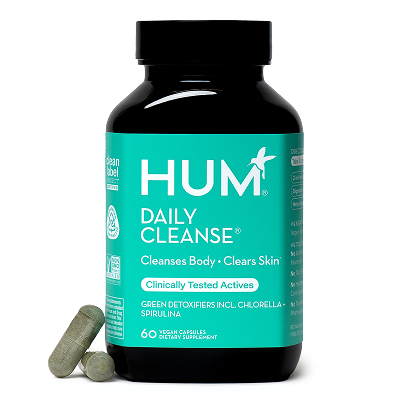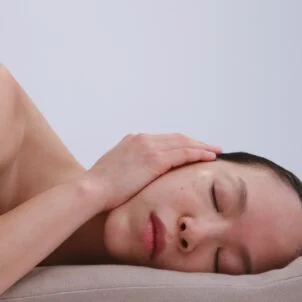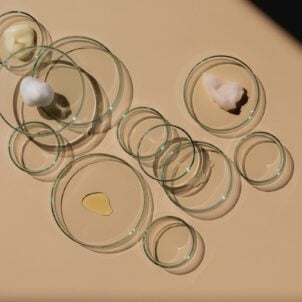Summertime skin blemish breakouts, let’s dive in!
Summer months mean sunshine, beach trips, barbecues, and pool parties. But amidst all the fun, you might notice something not so fun: extra breakouts. It’s actually quite common to experience an increase in acne during the summer months, but it’s totally treatable, so no need to worry.
Below, we break down why you might break out more in the summer and how to clear it up with an expert-approved summer face skincare routine. Plus, the best supplements from yours truly that will help ease skin woes for the long haul.
Why You Might Break Out More in the Summer

If you notice more pimples popping up during the summertime, it’s not just in your head. The sunny season can cause more blemishes. “Warm, hot, humid environments can cause increased oil production,” says board-certified dermatologist Caren Campbell, MD. “Acne-causing bacteria likes to grow in oil, so the more oil on the skin, the more the bacteria—which leads to more breakouts.”
You might also be touching your face more often than usual (to wipe away some sweat), which can transfer the oils from your hands to your face. If you’re using sunscreens or makeup formulated with oil, they can potentially cause more breakouts, too.
Summertime Face Skincare 101
If you’ve noticed new breakouts appearing in the summer, don’t stress. We put together an expert-approved face skincare routine to banish breakouts.
- Get a benzoyl peroxide or sulfur face wash
Using the proper face wash can help fight against acne-causing bacteria and clear up your complexion. “The best place to start is to use a five percent or less benzoyl peroxide wash or sulfur wash once per day,” Dr. Campbell says.
Word to the wise: Skip any kind of oil cleansers as well. Acne forms due to an excess of oil, so adding more oil to your complexion can lead to more breakouts.
- Get started with a retinoid
“Retinoids like tretinoin or over the counter adapalene are the mainstay treatments for acne,” Dr. Campbell says. Use a pea-sized amount all over the face two to three times per week. If you have sensitive or dry skin, put a moisturizer on top after applying your retinoid.
A note of caution: Retinoids remove the top layer of dead skin cells so they don’t clog pores. Using them will make your skin sensitive to the sun, so apply a broad-spectrum sunscreen every day to protect your complexion.
- Hands off
Your hands carry oil and bacteria (sounds gross, but it’s completely normal). Touching your face transfers that to your skin, which can clog your pores and cause breakouts. Keep your hands off your face when possible, and be sure to regularly wash your hands with soap and water.
- Add a face skincare supplement
To give your face skincare routine a boost, add in a supplement, like our Daily Cleanse. It’s formulated with an effective blend of 14 detoxifiers, such as matcha green tea powder, spirulina, and green algae. These powerful plant-based ingredients support the body’s natural ability to filter out toxins, supporting a healthy, clear complexion.
- Pick the right products
Oil in makeup and face skincare products can cause breakouts—especially in the summer when combined with sweat. To help keep your skin clear, opt for noncomedogenic formulas (meaning they’re made with ingredients that won’t clog your pores).
Summer Face Skincare FAQs
Does Daily Cleanse have a skin purging phase?
Daily cleanse is designed to gently cleanse your system, but if you notice a slight increase in breakouts, it may be because your body is adapting. We recommend reaching out to your HUM RD Nutritionist if you have any questions.
Can I take Daily Cleanse with other supplements?
We don’t recommend taking Daily Cleanse with Base Control, and Hair Strong Gummies, as combining all three of these will exceed the daily amount of zinc your body needs.
Should I use a retinoid every day?
Retinoids can be harsh on your skin. Using them two to three times per week will still deliver results without causing redness, drying, or flaking. Make sure to use a moisturizer and sunscreen as well.
Are prescription or over-the-counter retinoids better?
Both prescription and over-the-counter retinoids are safe and effective. Prescription-strength retinoids are stronger and can be tailored to your skin’s specific needs. However, over-the-counter options work just as well with time and consistency.
My skin’s still not clearing up—what should I do?
If you’ve tried this face skincare routine and aren’t seeing results (remember: It can take a couple of weeks to a couple of months), consult a board-certified dermatologist.









